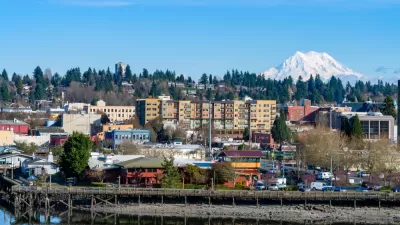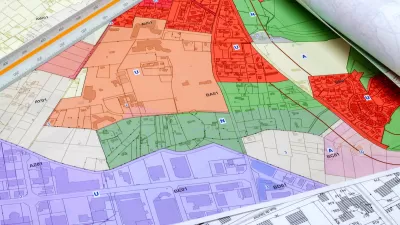Land use and zoning reform is not a magic wand, and effective changes to any planning regime change requires careful work. A new report Urban Institute provides case studies and guidance on how to achieve desired outcomes from a reform process.

Lydia Lo and Eleanor Noble share news of a new Urban Institute report that focuses on the factors that make land-use reforms most effective in promoting housing production and how cities can ensure that new laws produce desired outcomes.
The report examines two land use reform case studies, accessory dwelling unit (ADU) laws in Washington, D.C. and Portland, Oregon. Both took a different approach to ADUs as a response to the demands of increasing populations, and both have different results, with Portland increasing annual ADU by 600 percent, and D.C. went from an average of one ADU produced a year, to an average of 23 ADUs per year.
According to the report, four key takeaways can inform effective land us reform, shared here with more details on each point listed in the source article:
- Establish shared and coherent urban planning goals
- Analyze volunteer participants’ economic and racial composition and supplement their input (as needed) with data to ensure representative decisionmaking
- Reform regularly as new evidence emerges
- Strengthen other housing system supports
According to the article, planners shouldn't take it as a given that land use reforms will create the outcomes demanded of the AICP Code of Ethics: even reforms that do achieve the desired increase of housing production might fail to benefit all the residents of a community.
The need for effective land use reform—not just performative reform that checks political boxes but doesn't achieve the desired change—is on display currently in Minneapolis, which is drafting the zoning code changes necessary to implement the vision laid out by the Minneapolis 2040 Comprehensive Plan.
For more on effective land use reform, see previous coverage of other expert takes on the subject from Planetizen:
- Opinion: The Zoning Reform Discourse Needs a Dose of Reality (August 3, 2020)
- A Playbook for Achieving Meaningful Development Regulation Reform (October 18, 2017)
FULL STORY: Four Lessons to Strengthen Land-Use Reforms

Planetizen Federal Action Tracker
A weekly monitor of how Trump’s orders and actions are impacting planners and planning in America.

Restaurant Patios Were a Pandemic Win — Why Were They so Hard to Keep?
Social distancing requirements and changes in travel patterns prompted cities to pilot new uses for street and sidewalk space. Then it got complicated.

Maui's Vacation Rental Debate Turns Ugly
Verbal attacks, misinformation campaigns and fistfights plague a high-stakes debate to convert thousands of vacation rentals into long-term housing.

Boulder Eliminates Parking Minimums Citywide
Officials estimate the cost of building a single underground parking space at up to $100,000.

Orange County, Florida Adopts Largest US “Sprawl Repair” Code
The ‘Orange Code’ seeks to rectify decades of sprawl-inducing, car-oriented development.

Maui's Vacation Rental Debate Turns Ugly
Verbal attacks, misinformation campaigns and fistfights plague a high-stakes debate to convert thousands of vacation rentals into long-term housing.
Urban Design for Planners 1: Software Tools
This six-course series explores essential urban design concepts using open source software and equips planners with the tools they need to participate fully in the urban design process.
Planning for Universal Design
Learn the tools for implementing Universal Design in planning regulations.
Heyer Gruel & Associates PA
JM Goldson LLC
Custer County Colorado
City of Camden Redevelopment Agency
City of Astoria
Transportation Research & Education Center (TREC) at Portland State University
Camden Redevelopment Agency
City of Claremont
Municipality of Princeton (NJ)





























